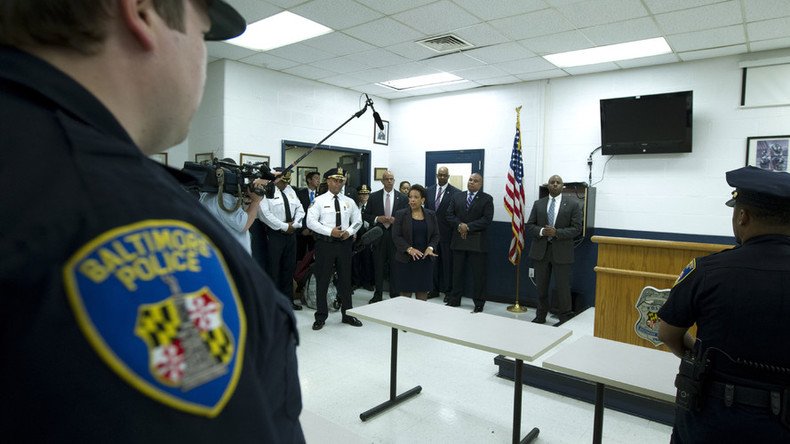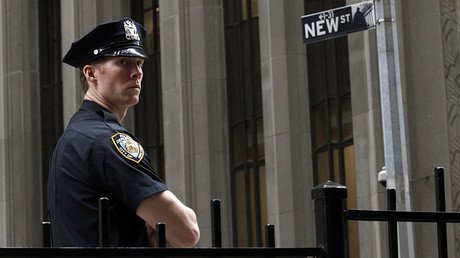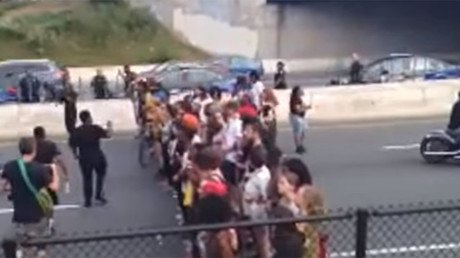DOJ finds Baltimore PD targeted minorities, ignored and belittled sexual assault cases

The Department of Justice's review of the Baltimore Police Department is out, and it’s not pretty. The DOJ found Baltimore’s practices were “explicitly discriminatory,” using a questionable amount of time and resources on targeting black communities.
Following the acquittal of three police officers in the death of Freddie Gray, and charges being dropped against the other three involved, the report from the DOJ has been widely anticipated.
According to an advance copy of the report released Tuesday evening by the New York Times, the DOJ found that "supervisors have issued explicitly discriminatory orders, such as directing a shift to arrest 'all the black hoodies' in a neighborhood."
That’s just for starters.
The report is to be publicly released Wednesday. In it, the DOJ claims that the practices of Baltimore’s police department "perpetuate and fuel a multitude of issues rooted in poverty and race, focusing law enforcement actions on low-income, minority communities."
For example, of the more than 300,000 police stops recorded from January 2010 to May 2015, 44 percent of those were in the city’s Western and Central Districts. According to the Baltimore Sun, those areas represent 11 percent of the city’s population and are predominantly African-American.
That is just for the recorded stops. The report notes that “the true number of stops is likely far higher because BPD officers do not document stops consistently.”
The report used 2014 as an example, when there were 124,000 recorded stops but internal reports showed that officers completed reports for 37 out of a sample of 123 stops captured on their computer-aided dispatch system.
If that number holds true for the overall rate of reporting stops, then it would mean that there were actually 412,000 stops in 2014 alone.
Residents in the areas with higher stop rates undergo them frequently. The report noted that Freddie Gray had been stopped multiple times in one week without charges.
For residents who are charged, the charges offer little improvement to the community. The report found that when supervisors at Central Booking and prosecutors reviewed many of the non-violent misdemeanor offenses, such as disorderly conduct, failing to obey a police officer, “interference,” playing dice or being “rogue and vagabond,” they lead to a case dismissal.
The report found that over 20 percent of all disorderly conduct charges were dismissed, and 25 percent of the failure to obey charges never entered a courthouse.
The bias placed on searching for African-Americans was evident in the numbers, as they were 37 percent more likely to be searched by BPD and 23 percent more likely to be searched during traffic stops.
The stops of African-American citizens also seem to have offered fewer results from arrests. The report found that officers would find contraband on white citizens twice as often as they did searching African-Americans at traffic stops.
Federal investigators looked into complaints involving racial slurs and were baffled to find just one instance with racially charged epithets. When they changed the search to include slurs targeted at African-Americans, they found 60 misclassified complaints, all demoted to lesser offenses.
The report also found that officers were encouraged to engage in "unnecessary, adversarial interactions with community members.”
For use of force, the DOJ found that the BPD did not use it as a means to de-escalate a situation, but rather the opposite, leading to more conflict than necessary. The report cites training as a part of the issue, because it encourages tactics like pointing weapons at unarmed citizens to control a scene.
Families who called the BPD for help with a relative or friend in a mental health crisis seemingly ran the risk of having force used on the person, the report found. Often times, police are summoned to escort individuals going through a mental health crisis to the hospital. Between a lack of training and planning, officers often ended up in “violent confrontations with individuals with mental health disabilities or in crisis.”
Juveniles were also at risk to have unreasonable force used against them. Once again, a lack of training in properly handling developing youths to avoid setting them up for confrontation with police was to blame, according to the DOJ.
Let’s say someone wishes to make a complaint against the BPD and to follow protocol. The DOJ found that it will likely get them nowhere.
The report notes that “BPD places unnecessary conditions on the filing of complaints.” While they allow complaints to be made in person, over the phone, or electronically, filing complaints for serious accusations, such as using as excessive force, harassment, false imprisonment or abusive language, are required to be signed, notarized and filed in person.
To not have a complaint notarized is to waste a complaint. The report found that one individual had tried to give a statement over the phone, but was not comfortable coming to the BPD’s Internal Investigation Division to fill out a form and “have his statement notarized.” The BPD then claimed that the man had “failed to cooperate.”
The investigation also found that officers actively discouraged citizens from complaining, by engaging in abusive language, such as telling one African-American man to “take your black ass down to Kirk Avenue before the bus leaves because you know how you black people like the bus.” While Kirk Avenue is home to the BPD’s Internal Investigation Division, that was probably not helpful advice.
For those persistent enough to file a report, it is unlikely to be investigated. The BPD was found to compromise officer interviews, by allowing them to recite their administrative report. After that, the Internal Investigation Division would conclude the investigation.
The officers were likely to be prepared for the interview as well, because the investigation found that BPD has the tendency to inform officers that they are being accused almost immediately after the department receives a complaint.
While officers are required to receive notification of the allegations in order to obtain counseling for five days prior to the questioning, giving early notice is seemingly out of line. The heads up can even include the date and time of the incident, which allows officers to retaliate against the complainant.
The DOJ is not the first group to notice this problem – the internal audit brought this issue up back in 2014. Yet two years later, the BPD notifies its officers significantly earlier than standard protocol.
Victims of sex crimes did not fare much better. A chapter’s title, “BPD’S HANDLING OF SEXUAL ASSAULT INVESTIGATION RAISES SERIOUS CONCERNS OF GENDER-BIASED POLICING,” more or less summarizes the problem. The report used information from victim advocates who are meant to support victims as they navigate the often tumultuous criminal justice system. The report noted that sex workers were the most likely to be disregarded, despite “the vulnerability of those individuals to rape.”
The DOJ found that, “officers and detectives in the BPD’s Sex Offense Unit often question victims in a manner that puts the blame for the sexual assault on the victim’s shoulders.” The report mentioned one woman who attempted to report a sexual assault, only for BPD detectives to ask her, “Why are you messing that guy’s life up?”
One victim advocate told the DOJ about an incident at a party, where a detective in the BPD Sex Offense Unit said to other officers and victim advocates, “in homicide, there are real victims; all of our cases are bullshit.”
The DOJ also found an email exchange between a prosecutor taking a woman’s sexual assault case, saying, “this case is crazy… I am not excited about charging it. This victim seems like a conniving little whore.” A BPD officer replied, saying “Lmao! I feel the same way.”
Complaints against the BPD regarding their handling of sexual assault is nothing new. The department came under extreme scrutiny in 2010 in regards to misclassification of rape cases and their backlog of rape kits. Despite this, the DOJ found the BPD’s handling of sexual assault to be “grossly inadequate.”
This includes failing to collect evidence and to corroborate victims’ complaints, as well as neglecting to request lab testings for rape kits in “numerous cases of forcible rapes of women by strangers that presented circumstances suggesting that there might be serial rapists involved; however BPD detectives did not take the steps necessary to make that determination,” allowing rape kits to linger in evidence collection unit purgatory, and having less than half the rate of arrests in rape cases than the national average.
Officers who see these kinds of abuses going on are out of luck. The report found “a cultural resistance to accountability has developed and been reinforced within the Department. This culture further undermines accountability by discouraging officers from reporting misconduct and discouraging supervisors from sustaining allegations of it.”
The report details how the accountability system is centralized in the Internal Investigation Division (IID). The IID handles complaints of officer conduct from both the public and other officers. While they can bring allegations and discipline against officers, an officer can refuse to accept it at the command level and then the complaint goes to the Office of Administrative Hearings.
After more bureaucracy, the officers are entitled to a hearing, where one person is selected from a pool of BPD commanders. For more serious charges, a trial board is convened with two commanders, and one BPD officer of equal rank to the accused officer. If the officer is found not guilty by other members of the BPD, then there is no further recourse available to the department.
Even if the officer is found guilty, the commissioner can get involved and impose increased or decreased discipline, but increasing the discipline means that the officer is entitled to another hearing, and the cycle begins all over again.
All of this is not new to State’s Attorney Marilyn J. Mosby, who said her department will review the findings, but told the Baltimore Sun it "will likely confirm what many in our city already know or have experienced firsthand."
While it seems that many may be familiar with it, the report shows that they will likely be among certain neighborhoods.













